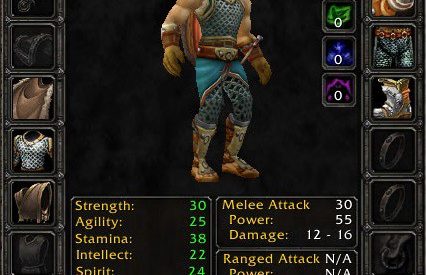A Looter Shooter is a genre of video games that fluidly mix RPG elements with a point-and-click style shooting game.
In my post What is the MMO Holy Trinity I gave a short primer on what an RPG is, with focus on games in a high fantasy setting (think elves, magic, dragons and the like.) I?d like to expand on that in how it relates to the genre of Looter Shooters.
In that post I mentioned that RPGs use baked-in attributes, numerically, to represent your character. They are things like how hard they can hit, how high they can jump, how fast they can run, or how smart they are. These in some ways define your character, and are doubly used to define how you can interact with the game. Looter Shooters are no exception to this, but their uniqueness has them do it in a slightly different way. It all starts with the looting system.
Randomness
When you spend a long amount of time in a fantasy world, you?ll inevitably find patterns in it. Maybe it?s the shape of rocks placed by hand by a developer that couldn?t be bothered to mix things up this time. Maybe it?s in the relationship between the dangerous of enemies and how quickly they can be dealt with. In any case, after too many times experiencing the same thing your brain will start to autopilot to the end. You know how it?s going to end, so things get boring. In comes randomization.
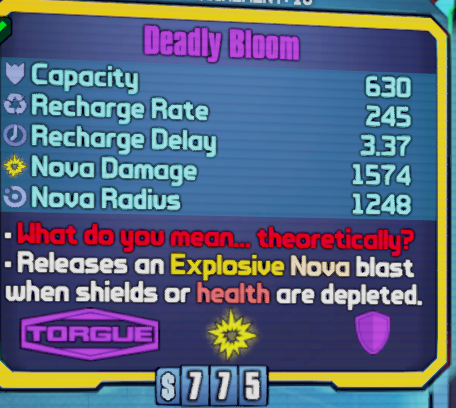 These numbers are certainly somewhat random. If I were to get this item at a higher level then the numbers would be higher, but still somewhat random.
These numbers are certainly somewhat random. If I were to get this item at a higher level then the numbers would be higher, but still somewhat random.
Adding randomness to aspects of the game makes it feel more alive if it?s done well. As an example, say you have played a game like this for a few hundred hours. After so much time in this world you have come to know it quite intimately. You have discovered the location of the best set of armor, and the shiniest and sharpest sword that exists in the game. You know exactly what it takes to get there, and how things will play out long in advance. Without any of this being random it?s a matter of pushing the button in the right order and presto. You have the best gear as quickly as possible?. you and everyone else, that is. What?s to stop literally everyone playing this to do exactly the same thing? Why would you experience any other part of the game if it didn?t mean getting to the best stuff for your character?
This is why you can?t guarantee where equipment comes from, or how good it is. That encourages the game to become too formulaic. Instead, you?re better off designing a loot system.
Loot
A loot system is designed to randomly calculate the reward you get from a challenge. It could be slaying the troll under the bridge or the ogre in the mountains. It could be delivering important military orders to the front lines. It could be stealing explosives from a group of bandits. Regardless of the task, the reward is often money or stuff. Where stuff depends on the type of game you?re playing, money is more or less universal.
The reward you are given by a loot system can be pretty randomized. As I have written in my post about Procedural Content in Video Games creating things at random is easy. Creating endless interesting things, is impossibly hard. One of the most widely used systems for random generation of equipment is done with building blocks.
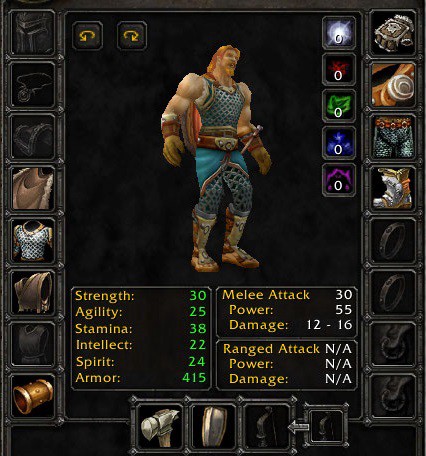 WoW?s (an MMORPG) equipment screen
WoW?s (an MMORPG) equipment screen
This equipment is typically the same you?d see in an RPG. You?ll have armor/clothing/equipment for the head in the form of a hat or helmet. Usually you?ll also have some for the for the chest, legs, hands, and feet. To what extent the game allows you to have equipment varies, for example WoW and most other MMORPGs will have hand equipment as well as slots for magical rings. Destiny, a looter shooter, still has the former but lacks the latter. Borderlands has even less, instead focusing more on what weapons you?re carrying then any potential armor slots. All armor is aggregated into one slot for a ?shield? equipment, simplifying and focusing the loot.
x of the y
What you do is design equipment with a base name, and not much flavor. You do this for a great many items, let?s say you make 5 items like this. Each item has a name, art, and possibly some incredibly simplistic base numbers that could be useful to anyone. The numbers on this base item make it not very good, but that?s alright.
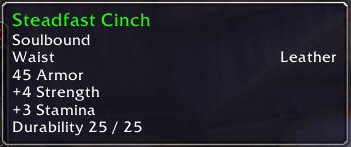 Typical RPG-esque equipment as seen in World of Warcraft. ?Steadfast? being a modifier, probably for strength and stamina.
Typical RPG-esque equipment as seen in World of Warcraft. ?Steadfast? being a modifier, probably for strength and stamina.
Then, you create 5 prefixes that could go onto the beginning of the names of any of these. Things like ?warrior?s?, ?awesome?, or ?smelly? could be seen here. You assign attributes to these prefixes. Anything with the ?warrior?s? prefix has +2 to the strength attribute, because that?s what a warrior probably has a lot of. Combing these prefixes with the base names can net you 5 x 5, 25 items. When you need to create a new piece of equipment you randomly choose the base, randomly choose the prefix, stick the prefix on the base and there you have it ? a randomly generated item.
What you can do with prefixes likewise you can do with a suffix. Maybe things ending in ?of the wise? grants you some increase to the intelligence statistic. Five suffixes on top of your five bases and five prefixes is 5x5x5, 125 piece of equipment. You only need to create the parts, and put them together.
Instead of a prefix-base-suffix system you could also just as easily have a big bag of attributes that could go in any order. Then if you want to make any item better, just stick more of these attributes to it. Using that method the 15 items you made before could be used to create more than the 125 using the prefix-base-suffix method. With 15 items added in any order, that?s 2? or 32,768 unique combinations!
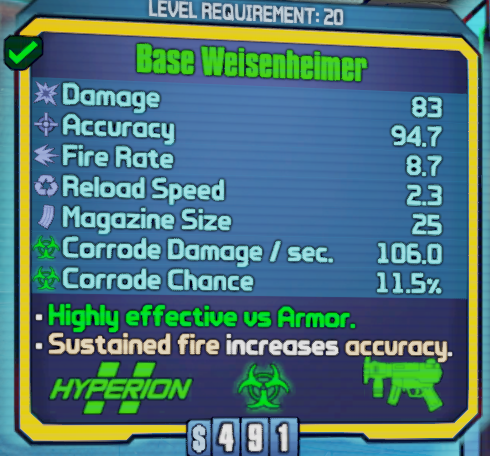 Here in Borderlands 2 ?Base? and ?Weisenheimer? probably have their own significance.
Here in Borderlands 2 ?Base? and ?Weisenheimer? probably have their own significance.
Looter Shooters
Finally, we can get to the genre at hand. Looter Shooters apply this equipment randomization technique to the creation of the only equipment you have at your disposal in most shooting games. Your gun.
Instead of the strength or agility attributes other RPG equipment might have, Looter Shooters randomize guns and the attributes associated with a firearm. How quickly can you reload it, how fast does it shoot, how much damage does it do, and how strong is its recoil? These and more define the attributes of the guns in a Looter Shooter. Special guns will even behave in certain physics-defying ways because these are video games, and if breaking physics is fun it?s bound to happen.
Borderlands
The biggest name in Looter Shooters is probably the Borderlands games, by Gearbox Software. Though they didn?t pioneer the idea of equipment randomization, it was the Borderlands games that first blended the two genres.
Borderlands games don?t take themselves too seriously. No, that is probably put too mildly. They?re packed to the rim with silly dialogue and ridiculous plot points, so much so that you may even append comedy to its genre. Between the introduction of a genre, the silly plot, and the cell-shaded graphics the Borderlands series has cemented itself in the history of video games. Borderlands at the time of writing is just about to see its 3rd major release in the series.
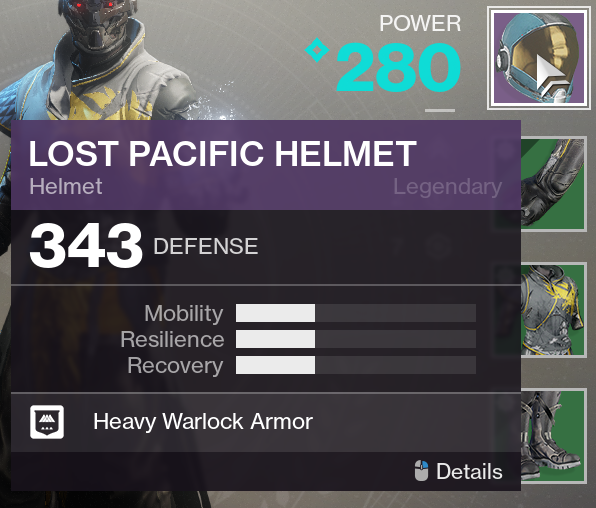
Destiny
After successfully creating the massive franchise that is Halo, the studio Bungie decided they weren?t done making massive impacts to the world of gaming. Destiny took Looter Shooters to a whole new level. It?s an MMO. Borderlands may have started it and had some semblance of multiplayer, it was unquestionably a single-player game. Not that there?s anything wrong with that, but Bungie apparently decided that its true potential was as part of an MMO.
The concept of Destiny on its face almost sounds like the pitch of a crazy person. ?We?ll have aliens and robots in space. Shooting laser guns, using magic, and we?re going to see a million people online every day!? As ridiculous as it might seems they made it a reality, and it?s one of the most popular MMOs at the time of writing. It has fluid movement, tight controls, excellent scenery, and a server architecture to support its concurrent player-base. Said player-base may not have nothing but good things to say about it, but their continued subscription speaks louder than words. Destiny 2, keeps to the same genre, but introduces a new story to be told and new guns to loot.
The Division
The most recent addition to the world of Looter Shooters is The Division, by Ubisoft. Following in Destiny?s footsteps by a few years we see an adherence to some of what makes Destiny do so well. It?s another Looter Shooter MMO, though it sees a change of scenery. Set in a pseudo-post-apocalyptic New York, The Division finds itself a little more rooted in reality than Destiny. With more modern equipment and guns, the variance on them is more tame.
Currently on its second title, aptly The Division 2, it has seen some improvements. The first one sold moderately well, but it?s nowhere near the titans that are the success created by Destiny or Borderlands. If you go off purely money made Destiny and any other MMO Looter Shooter will easily blow the single-player games out of the water. Subscriptions to online games, they make some serious cash for the studios that make them.
 A blueprint in warframe requires materials. All equipment is made or bought, with the materials being what you get from defeating enemies.
A blueprint in warframe requires materials. All equipment is made or bought, with the materials being what you get from defeating enemies.
Warframe
The last Looter Shooter I?d like to mention is a Free-To-Play(F2P) game called Warframe, made by a lesser known studio Digital Extremes. Like Destiny and The Division it?s an online game, though it blurs the lines between what you do by yourself and what you do with others. Being a F2P game it relies on micro-transactions and cosmetics to keep the servers online. It was released in 2013, and didn?t start off too well. After some much needed attention it has grown up big and tall to fit in its own niche of gameplay.
Warframe sports an interesting supporting lore, unique but somewhat confusing crafting system, and probably the most fluid control system I have seen in a video game to date. You control a futuristic cyber-ninja, wielding guns, boys, kunai, swords, and other very ninja-like things to infiltrate compounds, assassinate enemy leaders, save key VIPs, or raid a fortress for intel. As you?d expect of a ninja, you can run on run, jump high in the air, and dance around opponents too slow and lumbering to land a hit on you.
The largest difference between Warframe and the others here lies in the fact that enemies don?t drop guns. Instead they drop materials required to craft guns. It lies right on the precipice of not being a Looter Shooter, but in my mind it?s just close enough to the feel they provide to make the cut.
